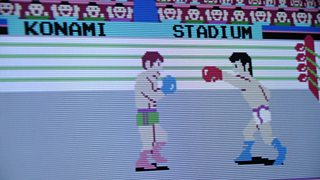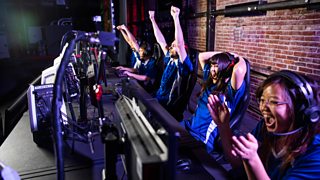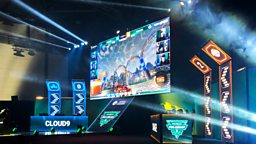What does it take to be an eSports pro?
Its top stars can earn millions of dollars a year, without breaking into a sweat. They train for hours a day and have legions of fans who fill stadiums to watch them. But these aren't normal sportswomen and men. They're part of one of the fastest growing industries in the world – eSports.
In The Irresistible Rise of eSports, presenter John Murphy discovers what it takes to become a successful eSports athlete. He asks, just how much money are the players at the top making, and what does the future hold for the industry?
A big business
ESports, or competitive gaming, is a lucrative business. The global audience is now estimated at more than 200 million and annual revenues from eSports, currently around $650 million for events, continue to rise. A number of video games – including Fifa, Call of Duty and League of Legends – now have their own international leagues and world championships, with players competing for big bucks.
The distinction between real, physical sport and this online, virtual version is narrowing. Top football teams like Manchester City and Paris St Germain now have their own eSports teams and, just like in traditional footy, players get bought and sold by the eSports clubs.
Eye-watering amounts of money
These eSports pros are cashing in on the growth industry too.

In a game like League of Legends, a player’s salary will range from $200,000 to $700,000 a year. Salaries in North America and Asia are even higher, with top players earning over $1 million a year.
And that’s before prize money comes into the equation. The League of Legends World Championship prize pool now stands at a whopping $1 million.
So what does it take to reach the top and be an eSports pro?
What it takes to make it
Fnatic is a professional eSports organisation – arguably the most successful in the West. Its headquarters are in Shoreditch, London, but it has offices in San Francisco, Berlin, Belgrade and Kuala Lumpur.
On visiting the Berlin office, In Business presenter John Murphy finds a main training room containing five desks with state of the art computers and monitors. On the wall above each desk hangs a shirt printed with the gaming name of each pro player.
Jan Hoffmann – manager of one of Fnatic’s teams – explains how players will arrive at work at around 11am or midday. After warming up and attending a briefing meeting the players will then practise late into the night. Just like a traditional sports team, the players are supported by coaches, analysts, psychologists and even a team chef.
Can video games be called art?

Turner Prize winning ceramicist Grayson Perry talks to the computer game creator and novelist Naomi Alderman.
“Most players drop out of high school”
Broxah – real name Mads Brock-Pedersen – is an athletic 21-year-old from Denmark and a pro on the Fnatic League of Legends team.

He explains how it’s important to stay fit in order to play well. “Going to the gym and just generally exercising in one way or another actually helps a lot with focus and confidence,” he says. He trains at the gym every morning before then gaming at the company office for somewhere in the region of 12 hours.
With developers constantly tweaking the game, he has to work hard to stay on top of changes.
The time pressure on players is enormous. Broxah finished high school but recognises that he is in the minority amongst pros: “Most players drop out of high school to try to attempt being a pro player.”
And although he’s doing what he loves, it’s not all fun. “I do still enjoy the game, but it’s not pure joy anymore,” Broxah admits. It’s hard work and sometimes he has to force himself to play. But with such vast sums of money involved, just a few years as a pro will set Broxah up for life.
What does the future of eSports look like?
If eSports really is the “next generation of sports” then eSports athletes could begin taking nutrition and training as seriously as traditional sports athletes. Jens Hilgers, founder of the first European eSports league and more recently BitKraft, the world’s first eSports investment firm, has invested in a performance nutrition company that specialises in gaming. “Our nutrition products focus on mental endurance,” says Jens, “so if you have a two, three hours gaming session the performance supplements of that company help you to be really kind of sharp during that time period.”
The Chinese and South Koreans certainly take eSports as seriously as any sport with it being announced that eSports will be medal events in the Asian Games in 2022.
Staff at Staffordshire University also see a big future in the industry. They now offer a degree course focused solely on the eSports business. Course leader Angela Lawrence explains how students “learn all about how to set up eSports events, the finances, the leadership and management of eSports and also the more technical side.”
Why video games have a positive effect on you

How playing video games can have a positive effect on your wellbeing, mood and creativity.
Investors are flocking to eSports
Computer companies but also car companies and even shampoo manufacturers are getting involved in sponsorship in a quest to reach a younger audience.

And it’s not just the pros who receive sponsorship – it’s also the amateurs and influencers who stream their own gaming online to millions of viewers.
Sam Mathews, the founder of Fnatic, is in no doubt about the industry's future: “It’s here to stay, it’s going to be a huge global phenomenon.”
With millions of people eager to spend their time watching and playing games, and with the UK video games sector now worth more than films and music combined, it’s hard to argue with him.
More from Radio 4
-
![]()
In Business: The Irresistible Rise of eSports
Sport, yes, but not as you know it. The irresistible rise of competitive gaming or Esports.
-
![]()
Seven reasons playing video games is good for you
How gaming could make you a better person.
-
![]()
Game on! The language of video games explained
How gaming is influencing our language. It's time for you to level up!
-
![]()
Front Row: Naomi Alderman on video games
Naomi Alderman on why video games haven't received the cultural recognition of other art forms.





